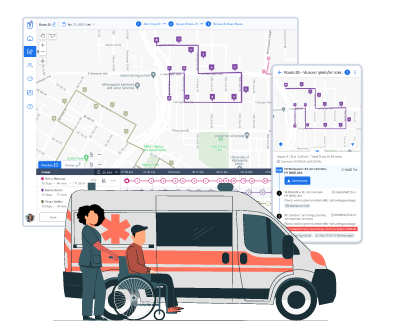
Streamlining Logistics with Truck Dispatching Software
In today’s fast-paced world, logistics play a crucial role in the success of businesses across various industries. Effective logistics management is essential for ensuring timely delivery, reducing costs, and improving customer satisfaction. One vital component of efficient logistics is truck dispatching.
Truck dispatching is the process of assigning and managing the movement of trucks to transport goods from one location to another. It involves coordinating drivers, routes, and schedules to optimize efficiency and meet customer demands. In the past, dispatching was often a complex, time-consuming, and error-prone task that relied heavily on manual processes.
However, with the advancement of technology, the logistics industry has seen a significant transformation. Truck dispatching software has emerged as a game-changer, offering numerous benefits to logistics companies, carriers, and shippers. This software streamlines the dispatching process, making it more efficient and cost-effective.
In this article, we will delve into the world of truck dispatching software, exploring its key features, benefits, and the impact it has on the logistics industry. We will also discuss how it can help businesses save time, reduce errors, and improve customer satisfaction.
The Power of Truck Dispatching Software
Truck dispatching software is a powerful tool that leverages technology to optimize the logistics process. It automates many tasks that were previously done manually, resulting in enhanced efficiency and accuracy. Let’s take a closer look at how this software works and the advantages it brings.
1. Automated Dispatching
One of the primary functions of truck dispatching software is automating the dispatch process. This software uses algorithms and real-time data to assign jobs to available drivers based on various factors, such as proximity, load capacity, and delivery time windows. This automation reduces the risk of human error and ensures that the most efficient route and driver are selected for each job.
2. Real-Time Tracking
Truck dispatching software provides real-time tracking of shipments, allowing dispatchers and customers to monitor the status and location of each delivery. This feature enhances visibility and transparency, enabling quick responses to any issues that may arise during transportation.
3. Efficient Route Planning
Efficient route planning is essential for saving time, fuel, and reducing wear and tear on vehicles. Truck dispatching software uses advanced algorithms to calculate the most efficient routes, taking into account factors like traffic, road conditions, and delivery priorities. This results in cost savings and faster delivery times.
4. Improved Communication
Communication is a critical aspect of logistics. Truck dispatching software facilitates seamless communication between dispatchers, drivers, and customers. It provides a centralized platform for sharing information, such as delivery instructions, changes in schedules, and any unexpected delays.
5. Paperless Operations
Gone are the days of manual record-keeping and paperwork. Truck dispatching software allows for paperless operations, reducing administrative burdens. All relevant information, including bills of lading and delivery confirmations, can be stored electronically, making it easily accessible and searchable.
6. Performance Analytics
Data is a valuable resource in logistics. Truck dispatching software collects and analyzes data on driver performance, delivery times, and other key metrics. This data can be used to identify areas for improvement and make informed decisions to optimize the logistics process.
7. Customer Satisfaction
With real-time tracking, accurate delivery estimates, and improved communication, truck dispatching software contributes to higher customer satisfaction. Customers receive up-to-date information about their shipments, reducing anxiety and uncertainty.
8. Cost Reduction
Efficiency gains achieved through truck dispatching software lead to cost reductions. With optimized routes and reduced idle time, fuel expenses are minimized. Moreover, automated dispatching reduces the need for additional administrative staff, resulting in labor cost savings.
9. Compliance and Safety
Truck dispatching software can help ensure compliance with safety regulations and hours-of-service rules. It can also monitor driver behavior, such as speeding or harsh braking, promoting safe driving practices and reducing the risk of accidents.
10. Scalability
Whether you are a small logistics company or a large carrier, truck dispatching software is scalable and can adapt to your needs. It can grow with your business, accommodating an increasing number of drivers and shipments.
11. Integration with Other Systems
Truck dispatching software often integrates with other logistics systems, such as warehouse management and inventory control. This seamless integration streamlines the entire supply chain, from order processing to final delivery.
12. Environmental Benefits
Efficient route planning and reduced idle time contribute to lower fuel consumption and, consequently, reduced carbon emissions. Many businesses are adopting green logistics practices to minimize their environmental impact, and truck dispatching software aligns with these efforts.
Key Features of Truck Dispatching Software
Truck dispatching software offers a wide range of features designed to make the logistics process as efficient as possible. Let’s explore some of the key features that set this software apart.
1. Job Assignment
The software automatically assigns jobs to drivers based on predefined criteria, ensuring an equitable distribution of work. Dispatchers can also manually assign jobs when necessary.
2. GPS Integration
GPS integration provides real-time location tracking for each vehicle in the fleet. Dispatchers can monitor routes and make adjustments as needed to avoid delays.
3. Load Optimization
Load optimization algorithms help maximize the use of available space in each truck, reducing the number of partially filled shipments.
4. Customer Portal
A customer portal allows clients to track their shipments, view delivery windows, and make special requests, enhancing their experience and reducing support calls.
5. Driver Mobile App
Many truck dispatching software solutions come with a mobile app for drivers. This app provides them with all the information they need for their routes, as well as the ability to submit delivery confirmations and report issues.
6. Reporting and Analytics
Detailed reports and analytics help logistics companies identify trends, make data-driven decisions, and continually improve their operations.
7. Automated Notifications
The software can send automated notifications to customers and drivers, keeping them informed about order status, delivery times, and any changes in the schedule.
8. Dispatch Scheduling
Dispatch scheduling tools allow for the efficient allocation of jobs throughout the day, reducing idle time and optimizing productivity.
9. Fuel Management
Some software solutions offer fuel management features, helping companies monitor and reduce fuel consumption.
10. Compliance Monitoring
Compliance features ensure that drivers adhere to safety regulations, hours-of-service rules, and other legal requirements.
11. Document Management
Document management capabilities make it easy to store and access essential documents, such as bills of lading and delivery receipts.
Benefits of Truck Dispatching Software for Businesses
Now that we’ve explored the features of truck dispatching software, let’s delve into the benefits it brings to businesses in the logistics industry. These advantages are the driving force behind the widespread adoption of this technology.
- Increased Efficiency
Efficiency is at the core of what truck dispatching software offers. By automating tasks like job assignment and route planning, this software optimizes every aspect of the logistics process, resulting in faster deliveries and reduced operational costs.
- Enhanced Customer Satisfaction
Customers expect transparency and real-time updates on their shipments. Truck dispatching software empowers logistics companies to provide accurate tracking information, delivery estimates, and immediate notifications of any changes. This level of communication enhances customer satisfaction and builds trust.
- Cost Savings
Efficient route planning, load optimization, and reduced idle time lead to substantial cost savings. Companies benefit from lower fuel expenses, reduced labor costs, and a decrease in operational errors.
- Improved Decision-Making
The data collected and analyzed by truck dispatching software provides valuable insights into operations. This information empowers businesses to make informed decisions, optimize their processes, and identify areas for improvement.
- Scalability
As businesses grow, their logistics needs evolve. Truck dispatching software is scalable and can accommodate an increasing number of drivers and shipments. This adaptability ensures that the software remains a valuable asset as companies expand.
- Competitive Advantage
In a highly competitive industry like logistics, staying ahead of the curve is crucial. Truck dispatching software not only streamlines operations but also positions companies as leaders in efficient, customer-focused logistics services.
- Reduced Environmental Impact
By promoting efficient route planning and reduced fuel consumption, truck dispatching software contributes to sustainability efforts. Businesses can align with environmental goals and reduce their carbon footprint.
- Regulatory Compliance
Truck dispatching software helps ensure compliance with safety regulations, which is essential for avoiding penalties and maintaining a good reputation in the industry.
- Improved Driver Performance
Through performance monitoring and feedback, the software helps improve driver behavior, reducing the risk of accidents and ensuring a high level of professionalism in the field.
- Streamlined Administrative Tasks
The transition to paperless operations reduces administrative burdens and the risk of errors associated with manual record-keeping.
The Impact on the Logistics Industry
The impact of truck dispatching software on the logistics industry cannot be overstated. It has transformed the way logistics companies operate, leading to significant improvements in the efficiency and effectiveness of the entire supply chain. Let’s explore some of the key ways in which this software has reshaped the industry.
- Greater Efficiency
Efficiency is the backbone of any logistics operation, and truck dispatching software has taken it to new heights. Automated dispatching, optimized route planning, and load management have resulted in faster deliveries and reduced costs.
- Improved Customer Experience
Customer expectations have evolved with the digital age. They now demand real-time tracking and constant communication regarding their shipments. Truck dispatching software allows logistics companies to meet these demands, enhancing the customer experience.
- Reduced Environmental Impact
The logistics industry has come under scrutiny for its environmental impact, primarily due to fuel consumption and emissions. Truck dispatching software helps address this concern by promoting fuel efficiency and reducing the carbon footprint.
- Safety and Compliance
Safety is paramount in the logistics industry. Non-compliance with safety regulations can lead to accidents, fines, and damage to a company’s reputation. Truck dispatching software plays a pivotal role in ensuring that drivers adhere to safety rules and regulations.
- Adapting to Industry Trends
The logistics industry is constantly evolving. E-commerce, just-in-time inventory, and other trends require logistics companies to be agile and responsive. Truck dispatching software is adaptable and can accommodate the changing needs of the industry.
- Cost Reduction
Reducing operational costs is a priority for logistics companies. Truck dispatching software provides numerous cost-saving opportunities, from lower fuel consumption to streamlined administrative tasks.
- Data-Driven Decision-Making
In an era where data is king, the ability to collect and analyze information is invaluable. Truck dispatching software equips logistics companies with the data they need to make informed decisions and continually improve their operations.
- Competitive Advantage
The logistics industry is highly competitive. Truck dispatching software is no longer a luxury but a necessity for companies looking to gain a competitive edge. It positions businesses as leaders in efficiency and customer satisfaction.
Challenges and Considerations
While truck dispatching software offers many benefits, it’s essential to consider the challenges and potential pitfalls that companies may encounter during implementation and use.
- Initial Investment
The cost of acquiring and implementing truck dispatching software can be a barrier for some businesses. However, it’s essential to view this as an investment that will lead to long-term savings and improved efficiency.
- Training and Adoption
Transitioning to new technology requires training and adaptation. Employees, especially dispatchers and drivers, may need time to become proficient in using the software effectively.
- Integration with Existing Systems
Ensuring that the software integrates seamlessly with existing systems, such as inventory management and order processing, is critical for a smooth operation.
- Data Security
With the increasing reliance on digital systems, data security is a concern. Companies must ensure that sensitive information, such as customer data and internal records, is adequately protected.
- Technical Support
Access to reliable technical support is essential. Companies should choose software providers with a good track record for customer service and support.
- Customization
Different logistics companies have unique needs. Software should be customizable to accommodate specific requirements and workflows.
- Continuous Updates
Technology evolves rapidly, and software must keep up. Companies should choose providers that offer regular updates and improvements.
The Future of Truck Dispatching Software
The future of truck dispatching software is promising. As technology continues to advance, we can expect to see even more sophisticated features and capabilities. Here are some key trends and developments to watch for in the coming years:
- Artificial Intelligence (AI) and Machine Learning
AI and machine learning will play a more significant role in route optimization and load management. These technologies can adapt to changing conditions in real-time, further enhancing efficiency.
- Internet of Things (IoT) Integration
IoT devices will provide even more data points for logistics companies. They can track variables like temperature, humidity, and shock during transportation, ensuring the integrity of sensitive cargo.
- Blockchain for Transparency
Blockchain technology may be used to enhance transparency and traceability in the supply chain. This could have significant benefits for compliance, fraud prevention, and dispute resolution.
- 5G Connectivity
The rollout of 5G networks will enable faster and more reliable communication between dispatchers and drivers, allowing for even more real-time tracking and updates.
- Predictive Analytics
Predictive analytics will be used to anticipate and mitigate potential issues, such as traffic delays, weather disruptions, and maintenance requirements, before they affect deliveries.
- Green Logistics Initiatives
Environmental concerns will drive more logistics companies to adopt green practices, such as electric or hybrid vehicles and sustainable delivery methods.
Conclusion
Truck dispatching software has revolutionized the logistics industry, providing numerous benefits to businesses and customers alike. It streamlines operations, enhances efficiency, reduces costs, and promotes environmental sustainability. The real-world success stories of companies that have adopted this technology are testament to its impact.
While there are challenges to overcome, such as the initial investment and the need for training, the long-term advantages far outweigh the drawbacks. As technology continues to advance, the future of truck dispatching software looks promising, with the potential for even more sophisticated features and capabilities.
In a world where logistics plays a pivotal role in the success of businesses, truck dispatching software is the key to staying competitive, efficient, and customer-focused. It’s not just a tool; it’s a game-changer that transforms the way we move goods from one place to another, making the process smoother, faster, and more reliable.



